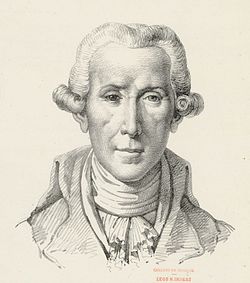
Back Luigi Boccherini AN لويجي بوكريني Arabic لويجى بوكرينى ARZ Luici Bokkerini Azerbaijani Луіджы Бакерыні Byelorussian Луиджи Бокерини Bulgarian Luigi Boccherini Catalan Luigi Boccherini Czech Luigi Boccherini Danish Luigi Boccherini German
You can help expand this article with text translated from the corresponding article in French. (November 2023) Click [show] for important translation instructions.
|
Luigi Boccherini | |
|---|---|
 Pencil drawing of Boccherini by Étienne Mazas after a portrait bust | |
| Born | 19 February 1743 Lucca, Republic of Lucca |
| Died | 28 May 1805 (aged 62) Madrid, Kingdom of Spain |
| Occupations |
|
| Works | List of compositions |
| Signature | |
 | |
Ridolfo Luigi Boccherini[1] (/ˌbɒkəˈriːni/,[2][3] also US: /ˌboʊk-/,[4][5] Italian: [riˈdɔlfo luˈiːdʒi bokkeˈriːni] ⓘ; 19 February 1743 – 28 May 1805) was an Italian composer and cellist of the Classical era whose music retained a courtly and galante style even while he matured somewhat apart from the major classical musical centers. He is best known for a minuet from his String Quintet in E, Op. 11, No. 5 (G 275), and the Cello Concerto in B flat major (G 482). The latter work was long known in the heavily altered version by German cellist and prolific arranger Friedrich Grützmacher, but has recently been restored to its original version.
Boccherini's output also includes several guitar quintets. The final movement of the Guitar Quintet No. 4 in D (G 448) is a fandango, a lively Spanish dance.
- ^ "Boccherini, Luigi". Dizionario Biografico degli Italiani (in Italian). Treccani. Retrieved 2018-05-10.
- ^ "Boccherini, Luigi". Lexico UK English Dictionary. Oxford University Press. n.d. Retrieved 9 July 2019.
- ^ "Boccherini". Merriam-Webster.com Dictionary. Merriam-Webster. Retrieved 9 July 2019.
- ^ "Boccherini". Collins English Dictionary. HarperCollins. Retrieved 9 July 2019.
- ^ "Boccherini". The American Heritage Dictionary of the English Language (5th ed.). HarperCollins. Retrieved 9 July 2019.
© MMXXIII Rich X Search. We shall prevail. All rights reserved. Rich X Search